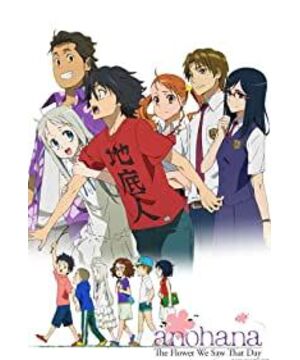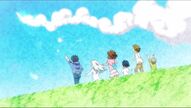"We Still Don't Know the Name of the Flower We Saw That Day" is a beautiful fairy tale, also known as "Unknown Flower Name", which was an animation in 2011. I call this work and "Your Lie in April", "Danko Family" and "Plastic Memory" together as the four masterpieces of tearjerking. First of all I think this is an animation that varies from person to person. The emotions that the audience receives in the animation are deep and shallow, which causes some people to burst into tears after watching it, and some people feel very hypocritical. My evaluation of this work is complicated. I have already read it, but I can't sort out my feelings for a while, so I didn't write a movie review, and I don't want to write a movie review. But the feeling this animation gave me was lingering in my mind, and finally decided to say it. (This article only comments on the animation of the eleven episodes, and does not comment on other related content) "Unknown Flower Name" tells a story that is delicate, deeply rooted, and closely related to reality. The male protagonist Renta, the female protagonist Mianma, Naruko, Bobo, Song Xueji and Tsurumi were the best playmates in childhood, but Mianma passed away in an accident. This makes other people gradually grow ill with each other and drift away. Until high school, the face code suddenly appeared in front of Ren Tai, and Ton Tai helped her realize her wish. During this period, the five people who had gone their separate ways got together again, gradually understood each other, and finally fulfilled the wish of the face code, and the face code Goodbye to such a beautiful story. The first half of the plot is relatively bland, and the intricate relationship between the protagonists in the middle makes me feel a little bit middle-of-the-road and hypocritical, losing some sense of substitution. But by the end of the climax, I was swept away from the feeling ahead, and all that was left was tears. In fact, savoring the story carefully, there is no middle school and hypocrisy, but the whole process is very moving. The reason why people feel this way, I think it is the problem of animation processing, which is also a major disadvantage of animation. For example, the use of lenses, image processing and the like. There are many moving parts in this film, but the animation processing problems make the effect of these places very bad. There is often a feeling that the audience's emotions begin to enter tears before they arrive, which is the so-called sensationalism. This question is much better at the end, and I can feel the mood of the protagonists. The characters are made of flesh and blood, very real. As I said, it is closely related to reality. The male protagonist is just an ordinary teenager, not absolutely gentle and kind, nor has any deep hatred. Like people in life now, he has a temper, gets angry, and is playful. Others too, more or less find some resonance in them. But there is still some dramatic treatment, otherwise who would watch a story that they experience every day. The ending song of the animation "secret base ~君がくれたもの~" adds a lot to the animation, and almost everyone who has watched this animation will be moved when they hear the song. Every time the music plays, my nose is sour. About this story I think it's like a wonderful fairy tale, impossible in the fantasy reality of doing things first. Secondly, the ending of the story is perfect. The six people were very close when they were children, and then gradually became estranged, and finally reconciled as before. The story in real life and governance basically ends when it gradually becomes alienated, and there is no more text. When I watch animations, including when I cry, I will recall my playmates when I was a child, and the contact between them has become less and less, and they have drifted away. Overall, this is a very good animation. Although the shortcomings cannot be said to be innocuous, they are also flawed. This article just wrote some of the things I want to say the most. I gave a general idea, and many details were not mentioned. Recommending everyone to watch the original film may not burst into tears like I did, but it will remind everyone of the lost childhood and childhood self.
View more about Anohana: The Flower We Saw That Day reviews











